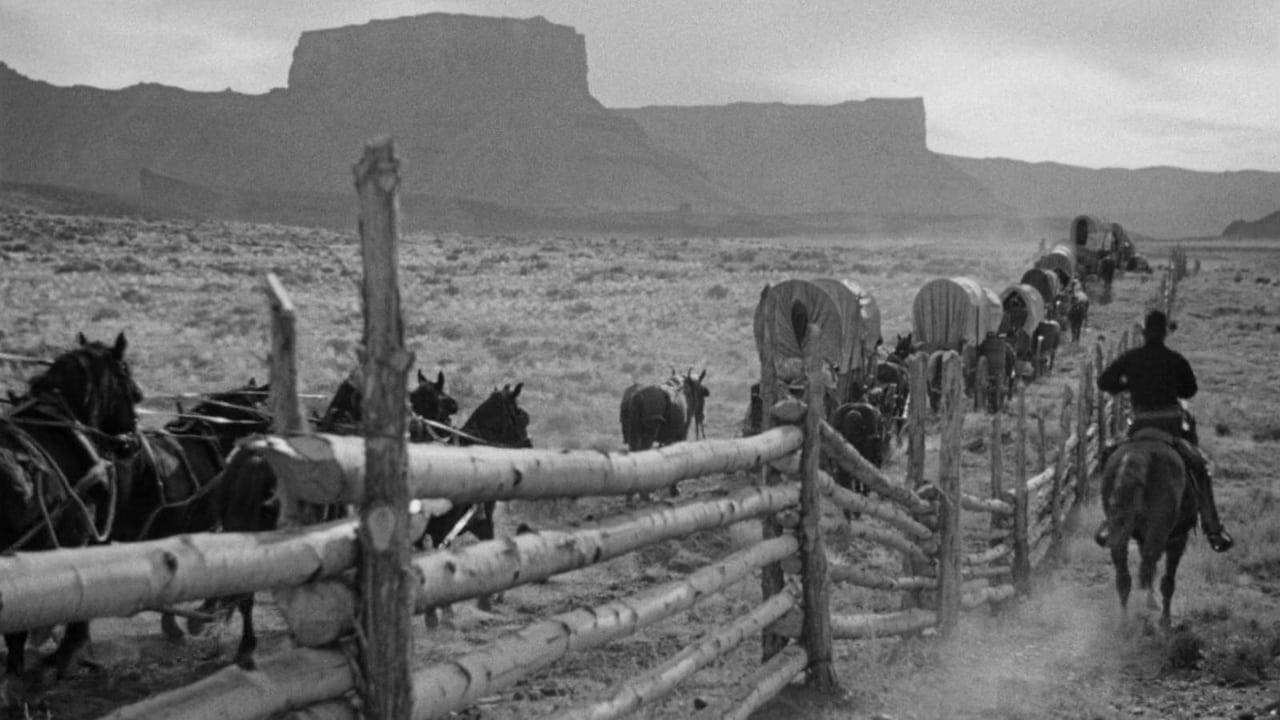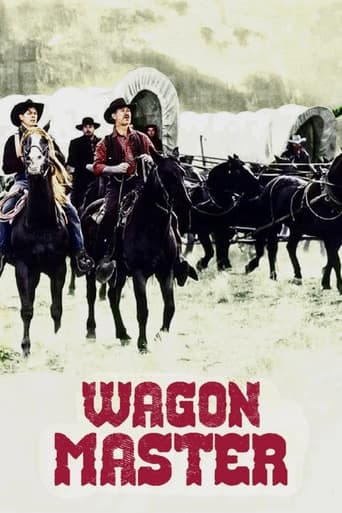

Wonderfully offbeat film!
... View MoreA waste of 90 minutes of my life
... View MoreIt's funny, it's tense, it features two great performances from two actors and the director expertly creates a web of odd tension where you actually don't know what is happening for the majority of the run time.
... View MoreIt's the kind of movie you'll want to see a second time with someone who hasn't seen it yet, to remember what it was like to watch it for the first time.
... View MoreIn Crystal City, a group of Mormons hire the horse traders Travis (Ben Johnson) and Sandy (Harry Carey Jr.) as wagon masters to lead their caravan to San Juan River. Along the journey, they meet first the broken wagon without water of the quack Dr. A. Locksley Hall (Alan Mowbray) and the prostitutes Denver (Joanne Dru) and Fleuretty Phyffe (Ruth Clifford). Then the sadistic outlaws Clegg boys decide to join the Mormon caravan to disguise the patrol leaded by the Sheriff of Crystal City that is chasing them. When the Navajos cross their path, they are invited to visit their hamlet for a dancing party. When the wagon train is near to their destination, the Clegg boys threaten the settlers, forcing Sandy and Travis to take an attitude."Wagon Master" is another great western of John Ford. The sequences with the wagon train crossing the desert and the hills are impressive. The adventure of the group of Mormons is funny and very entertaining and the songs fit well to the plot despite being dated. My vote is eight.Title (Brazil): "Caravana dos Bravos" ("Caravan of the Braves")
... View MoreA couple of cowpokes help a group of Mormons cross some rough country on their way to a new settlement. This low-key Western is unusual for Ford in that it lacks any big stars. Johnson gets top-billing but his is basically a supporting role, although he and Carey work well together. Dru is given little to do other than provide the love interest. The best performance is given by Ford favorite Bond, playing the leader of the Mormons. In fact, this role helped him land a starring role in the long-running TV Western "Wagon Train" before his untimely death at age 57. Featuring beautiful cinematography, Ford regarded this as one of his favorite films.
... View MoreThis film has to be as near to perfect a film as John Ford made. The film is magic, a masterpiece, the reason Ford was, well Ford. If you want to know why Ford was great this one explains it.The photography of course is superb, black and white as black and white should be, wonderful shots, not an over the shoulder conversation in it, pure Ford, great moments, big and little. The famous ripped pants of Ward Bond. Apparently two dogs kept invading the set and fighting so Ford wanted to use them in the fighting scene, but instead of fighting one dog ran away and the other attacked Ward Bond and ripped his pants, which caused Ford no end of mirth. A whole scene around plaiting a rope. The way Ben Johnson burn then snuffs his rope, wonderful foreshadowing and anticipation of the final. Harry Carey's naive courting of Prudence. The usual ford line about being scared and not showing it. Bond's horse accidentally falling in him and its left in the film. Johnson and Bond are fantastic in that scene. Lord help any Ford actor who does not stay in character while the camera is rolling even when a horse falls on top of you.A couple of very sweet romances, not intruding on the whole focus, two very likable leads, not to mention for the girls, the number of times the cameras focus on Ben Johnson's rather delightful backside.Lots of old time stuntmen getting lines and roles, Cliff Lyons, Frank McGrath. Some wonderful character studies mostly of faces staring, all the villains and main stars. A set of villains to rival any group in any western.Many many Fordian shots of faces, groups, children, women, small things happening, foals in the background (Ford seems to love images of foals), women in aprons, allowing the moment as wagons cross rivers and the camera lingers.This is probably not a western as much as an artist's picture that happens to be set in the west.Lucky the film was made in 1950 because it is impossible to imagine such a film could be ever made again, but then it is such a work of art that it would be a sacrilege to attempt it
... View MoreI don't think I really have any spoilers in here but since I do describe a couple of funny scenes, I'll check the box saying 'might contain spoilers' just to be on the safe side. Now...I hardly know where to start. By now you know the basic outline of the story - horse traders Travis (Ben Johnson) and Sandy (Harry Carey Jr.) take the job of guiding a Mormon wagon train West to their 'promised land' and along the way encounter a variety of trials and interesting characters, most notably the outlaw Clegg family.Anyone can enjoy this movie. You don't have to be a fan of Westerns to like this one. For one thing, Johnson and Carey are two of the most quickly likable characters you'll see in any movie. Carey in particular is animated and outgoing, almost like a big kid - while Johnson is a little calmer and wiser, kind of like an older-brother figure. I get a kick out of the scene where they sell the sheriff one of their 'gentle horses' for ten dollars; then inform him that the horse has "some peculiarities - you might say failings"... Travis elbows Sandy who lets loose with a shrill whistle, sending the sheriff's new horse off on a wild bucking fit with him in the saddle. The look on his face as the horse finally dumps him and gallops away is priceless.Pay attention to the music... even if you never thought you'd be a fan of the Sons of the Pioneers, listen to "Shadows in the Dust" as the wagon train is shown in motion with some of the people walking along between the wagons. It's a truly beautiful song- too bad only half a minute or so of it is in the movie. I want to hear the whole thing sometime.One thing that impressed me greatly about this movie is that much of it must have been almost as hard to make as the real situation it portrays. Teams of six horses pulling wagons up steep mountain trails, straining to make the top - this was no simple and easy film. It must have been risky for the actors, the stunt people and the animals as well. Fording rivers too, this movie has plenty of authentic-looking action involving the movement of the wagon train. It should be mentioned that both Harry Carey Jr. and Ben Johnson were extremely competent riders, both with many years' experience riding, roping, and doing all manner of cowboy-type things. Carey grew up on a ranch where his family employed many Navaho Indians and in fact he learned to speak Navaho before he learned to speak English. No rhinestone cowboys in this movie - "Travis" and "Sandy" were the real thing through and through.Watch for the scene when Miss Denver throws out the pan of water from her wagon, hitting Travis's horse in the face... the horse starts bucking, eventually throwing him off it. Watch the look on Sandy's face when Denver tells Travis 'I'm sorry you fell off your horse.' Another favorite scene of mine is when Harry Carey Jr. (Sandy) gets into a bit of a tiff with one of the Mormons. They're working back to back getting their gear ready, and after Sandy gets disgusted with the other fellow, the two of them get into a rear-end bumping match that quickly turns into a rolling-around-on-the-ground fist fight. Even after the Elder (Ward Bond) stands them up and separates them, the two combatants continue trying to get at each other. The Mormon (named 'Jackson' in the film) gets one final kick in at Sandy so high it hits his shoulder. It's a really funny scene from start to finish. I don't know what else I can say about this movie other than that it has a good story, very engaging characters, beautiful scenery and plenty of action balanced with humor and a bit of drama. Oh, it has been colorized, at least in the version I saw; not the most beautiful color film you'll ever see but I think I prefer it to black and white. I give this one a ten and I don't give out many 10's. One of my favorite movies, without a doubt. And, judging by the other comments, I have plenty of company in that assessment.
... View More